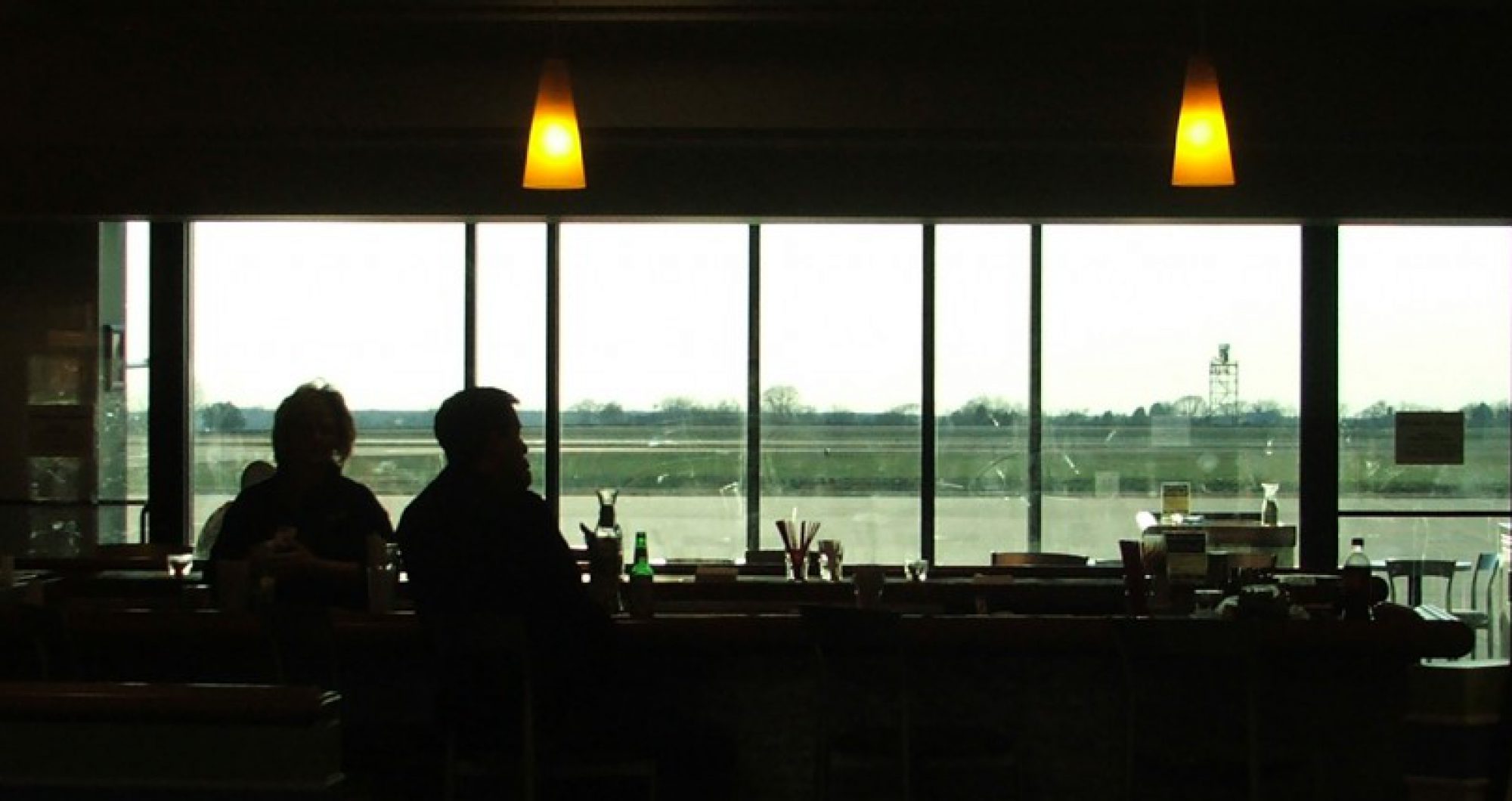 Juxtaposition
Juxtaposition
In the arrivals hall, men hold digital slates and cards with names. Look for your name. Oh, the garage is small. We enter London’s morning from the west. A Lucozade sign fizzes with neon effervescence. In a field by a roundabout a pony grazes under CCTV.
Each scene is puzzling and tightly packed, like a clue in a cryptic crossword. In the field, under surveillance, at home, headless, backwards, endless, initially, oddly. We carve and slice the words to revise our understanding of what is being said. The clue is always at the end or the beginning.
Remember this road? The grey barleycorn brick houses that would look so nice on a brochure if you crop out the eight lanes of traffic in the front yard. The Hogarth Roundabout, the Hanger Lane gyratory, traffic words from morning radio reports. Exhaust, exhausted. Many B&Bs along this way, thick blackout drapes, one hopes, double-glazing.
 The air is thick with pollution. A compact car is driven by an older man in a maroon sweater. Two passengers sleep with heads on pillows pressing against the windows. Long car journeys with boiled eggs and Thermoses of tea or coffee. Everything pushed together.
The air is thick with pollution. A compact car is driven by an older man in a maroon sweater. Two passengers sleep with heads on pillows pressing against the windows. Long car journeys with boiled eggs and Thermoses of tea or coffee. Everything pushed together.
On the Edgware Road, a man in a leather coat withdraws money from an ATM while two minders literally watch his back. Children ride ponies in Kensington Gardens. Look at the trees, mature plantings, so much texture, so many shades of green, so many shapes of leaves.
Remember that flat we looked at to buy that might have been a bordello? The windowless rooms, something sinister about it. We are in the street where the guidebook said the magical museum of childhood would be. I remember pushing the stroller, looking at the number on the page and the enticing description of the carousel that was no longer there. The museum had closed. I’d never heard of such a thing. More cheap rooms to let, bed and breakfast, fake School of English, visa scams.
On Baker Street a beefy Russian-looking guy in his late 50s with longish hair, linen blazer: “Darling,” he says into his mobile, “I want you to give me some good news.” Who would hang out on Baker Street with all the buses and traffic rushing by?
Reversals
The Older Daughter has an English accent. “Did you adopt her in London?” a child asked me recently.
 To solve the clues in a cryptic crossword, you have to read them the right way. It helps if you speak cricket and know the names of rivers. Once the answer reveals itself it’s hard to believe you hadn’t seen it all along. A clue gives the appearance of being a cohesive thought. The answer is defined by a word or words at the end or beginning. You have to work out which part is the definition, which the clue, and what type of clue it is. It is important to read each word independently of the others. The sentence is trying to push your thinking one way, but you have to resist and remember, it’s not really a sentence. You don’t understand what you’re reading yet, like being in a foreign country, where you don’t actually know exactly what you’re seeing.
To solve the clues in a cryptic crossword, you have to read them the right way. It helps if you speak cricket and know the names of rivers. Once the answer reveals itself it’s hard to believe you hadn’t seen it all along. A clue gives the appearance of being a cohesive thought. The answer is defined by a word or words at the end or beginning. You have to work out which part is the definition, which the clue, and what type of clue it is. It is important to read each word independently of the others. The sentence is trying to push your thinking one way, but you have to resist and remember, it’s not really a sentence. You don’t understand what you’re reading yet, like being in a foreign country, where you don’t actually know exactly what you’re seeing.
Containers
 There are more puzzles to solve on the tube: A man with a script for the Retiring Prime Wardens Succession Dinner. I read over his shoulder. It spells out the events to come, to take place in a hall, enacting centuries of protocol. He wears a cheap suit and gets off at London Bridge. The Guild of What? Prison wardens? Fishmongers? Cabbies?
There are more puzzles to solve on the tube: A man with a script for the Retiring Prime Wardens Succession Dinner. I read over his shoulder. It spells out the events to come, to take place in a hall, enacting centuries of protocol. He wears a cheap suit and gets off at London Bridge. The Guild of What? Prison wardens? Fishmongers? Cabbies?
A group of Italian girls enter the carriage, excited chatter, tourists, youth hostel. One girl with a flattened nose wears a tight tee-shirt that reads, “Bad decisions make good stories.” A souvenir to commemorate one already taken or part of her travel agenda? How good is her English?
Another mystery: those green sheds. They’re cafes for cabbies. One near us let us in once for tea.
 “Oh,” our driver says, “don’t tell anyone. There’ll be an uprising. They don’t know what to moan about next. Oh, the price of diesel. Oh, the last passenger I had put his feet on the seats.”
“Oh,” our driver says, “don’t tell anyone. There’ll be an uprising. They don’t know what to moan about next. Oh, the price of diesel. Oh, the last passenger I had put his feet on the seats.”
Moaning disguised as small talk in lift in Russell Square tube station:
“It’s slightly warm in here.”
“Just a bit.”
Homophones
 I buy a book of cryptic crosswords for the train to France. In France, it’s all a bit cryptic. If your grasp of your own language is tested by the crossword puzzle, you are now reduced to scrabbling for scraps of meaning. A friend who now lives in Paris says, “Five years on, I’m still Tarzan.”
I buy a book of cryptic crosswords for the train to France. In France, it’s all a bit cryptic. If your grasp of your own language is tested by the crossword puzzle, you are now reduced to scrabbling for scraps of meaning. A friend who now lives in Paris says, “Five years on, I’m still Tarzan.”
A sign for Abyss Piscines and the piscine, standing up on its end, looks from a distance like the niche for a saint or a virgin, abbess, station of the cross.
The Older Daughter invents words, like “ettigency,” but is also very literal. She struggles with idioms and hidden meanings, but she is unafraid to try French. She learns to ask kids at the pool to jump in with her, to sauter avec moi. Hide and seek in French, we learn, is cache-cache. But the girls are courageous about the cold water. Not brave. In French, brave means tough.
“When I grow up,” says the Older Daughter, “I want to hang out on a farm with animals, like Shirley Temple.”
Designer of abattoirs granted MP line crookedly (6, 7). That’s a bad one, but you get the idea.
Pieds sensible are not sensible shoes, but delicate feet. I understand this is about chiropody (podiatry) but choose to find the humor in the mistranslation and the belief that others will jump to the same initial mistake. Also, the shoes are sensible and the lady looking in the window has on sensible shoes, which makes it funny, in case that needed to be explained.
 A river of language, navigation, deviation. Interdit! Attention! To what? Of what? Beware of the something.
A river of language, navigation, deviation. Interdit! Attention! To what? Of what? Beware of the something.
Ah, I say, tapping my pen on the puzzle, not refuse, like won’t, but refuse, like trash.
The Younger Daughter dreams you need a language license and in her dream one of the children we are with trades his language for another. He gets a bad exchange rate and ends up with only half a vocabulary.
Some things transcend language: A woman at the train station comes out of the bathroom with the back of her skirt tucked into her large white underpants.
Foreign
 Dinner at the farmhouse in the vineyard. At the end of one long table is an English party of parents, grown children and their friends and partners, at the other the multilingual Dutch group staying on the caravan site. We are in the middle, with a couple from New Zealand—Liz and Jean. Jim? JEEN—and another couple from England, who create a very awkward break in the introductions when they arrive so that the slightly sunburned and apologetic girlfriend of one of the English sons is cut off just as she is about to introduce herself. English people can be mortified by introducing themselves. That end of the table are making an effort. She tries once more to go through with this humiliation, as one must in a foreign country, but the late-arriving English woman, missing the cues, is now being convivial and unwittingly casts them adrift, freeing them from the responsibility to speak to the rest of the table.
Dinner at the farmhouse in the vineyard. At the end of one long table is an English party of parents, grown children and their friends and partners, at the other the multilingual Dutch group staying on the caravan site. We are in the middle, with a couple from New Zealand—Liz and Jean. Jim? JEEN—and another couple from England, who create a very awkward break in the introductions when they arrive so that the slightly sunburned and apologetic girlfriend of one of the English sons is cut off just as she is about to introduce herself. English people can be mortified by introducing themselves. That end of the table are making an effort. She tries once more to go through with this humiliation, as one must in a foreign country, but the late-arriving English woman, missing the cues, is now being convivial and unwittingly casts them adrift, freeing them from the responsibility to speak to the rest of the table.
The Older Daughter talks to the Dutch party and uses some odd phrases of her own devising. I start to explain, but the man she is talking to looks over and says to me, “I understand.”
 Your Disney Experience begins long before you arrive. You are supposed to pre-select the color of your wristband, which you will use as a room key, admissions ticket and credit card. It probably records biometric data.
Your Disney Experience begins long before you arrive. You are supposed to pre-select the color of your wristband, which you will use as a room key, admissions ticket and credit card. It probably records biometric data.


























